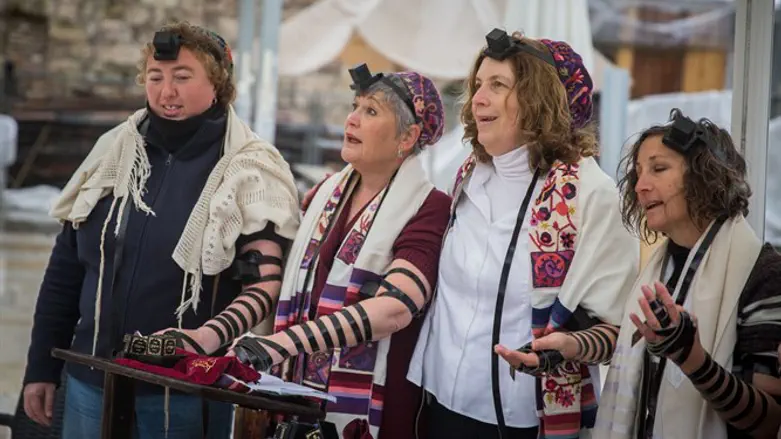
I never thought I would see my friend cry. She is as tough as they come.
Yet when a Women of the Wall (WOW) member pulled the scarf off my friend’s head, she burst into tears and ran out of the Kotel’s women’s section. With dignity stripped, her prayers were not to be completed this Rosh Chodesh (first day of the new Jewish month of) Av.
As I waited by the police precinct to give her support, we wondered why Women of the Wall did not bring their sefer Torah, as they had done for the past few months. What we heard next made us both physically sick. The authorities had found the scroll stashed overnight in the Kotel bathrooms.
While I had witnessed the scarf incident with my own eyes, the bathroom story sounded over the top. Yet within a few hours it was confirmed by additional sources and reported in media outlets. And while Women of the Wall have staunchly denied the story, as of this writing, they have not produced a different account of the events nor provided any explanation for the whereabouts of the scroll.
These unfortunate events are but a logical conclusion. When an organization that hardly musters 100 participants on a good month sets an agenda to pray “as we want” at a religious site with 1,500 years of prayer tradition and 10 million annual visitors, when the only barometer of morality is the “I”, when the service of God revolves around personal preferences, and the sanctity of prayer is usurped to prove a point, all means justify the end.
And that is not the Jewish way.
Judaism believes in the morality of sanctity. The sefer Torah is holy and its holiness creates a responsibility. When it passes around the synagogue, we kiss it with reverence. If it falls to the ground, everyone present fasts. Thousands of Jews have risked their lives over the centuries to save Torah scrolls from burning buildings. And when a sefer Torah finishes its service, it is buried, just like a human being. Mistreating a scroll in anyway is beyond imagination.
Yet mistreating a human being is worse. Pulling a head-covering off an observant woman is akin to undressing a person in public. Only a person with deep disrespect for women’s feelings would do something of the sort. And to imagine that this person is a woman belonging to a “feminist" organization dedicated to prayer is mindboggling.
Unfortunately, such disrespect has been the story of Women of the Wall since day one. Each month, as thousands of women try to concentrate their attention on the amida (the silent prayer), WOW leaders wave hands to encourage their followers to sing as loudly as possible. Dozens of women walk out of the women’s section in tears and shock as the holiness of the site is shattered by loud antics and numerous cameras.
Many women have stopped coming to the Kotel on Rosh Chodesh, because they cannot see their traditions trampled upon. Many others have tried asking, pleading, crying, and protesting to get Women of the Wall to understand that the monthly ritual contradicts the existing tradition and hurts the feelings of the overwhelming majority of regular worshippers.
Yet these pleas have fallen on deaf ears. Women of the Wall have styled themselves as the victims, vilifying the female worshippers a “psychological lynch mob” acting at the direction of “rabbi-handlers”. At other times, the group presumes to educate the worshippers, “model[ing] to all Jewish women” how to conduct their religious lives. And if that’s not enough, when tone-deaf in particular, WOW leadership takes credit for empowering the group’s opponents and giving them the voice to protest.
Over the past seven years, numerous organizations and individuals have tried unsuccessfully to facilitate dialogue between WOW and traditional worshippers. Personally, I have made numerous attempts to sit one of the group’s leaders to a simple, informal, off-the-record cup of coffee. All such attempts have been rebuffed.
So wrapped up in doing things as they see fit, WOW does not see anyone beyond the fringe of their tallit. So concentrated on their battle, the feelings of other worshippers don’t figure into the equation.
The Baal Shem Tov taught that a person should find takeaways in everything he sees and hears. The Talmud says that if a person does not approach the Torah properly it can become toxic.
Putting the “I” before everything else is the main obstacle both in the service of God and in loving our fellow Jew. It can cause us to distort God’s will to such a degree that we end up in the figurative outhouse. Seeing the absurd outcomes of worshipping the ego should give each one of us a pause, especially in these days of mourning for the Temple.
It seems that Women of the Wall are challenging all of us to take steps to downplay the ego and see more of the people around us.
It’s time to move beyond the morality of the I.
Leah Aharoni is the founder of Women For the Wall, a grassroots women’s organizations dedicated to preserving the tradition at the Western Wall in the spirit of Jewish unity.